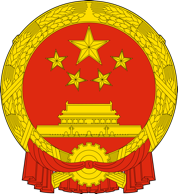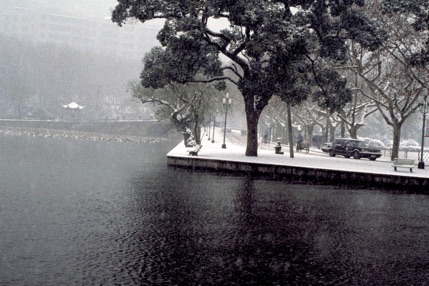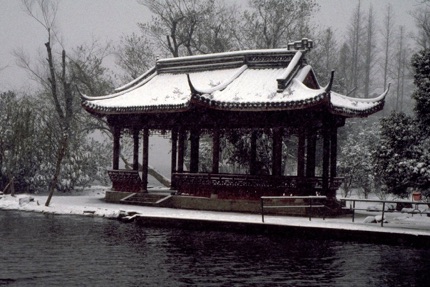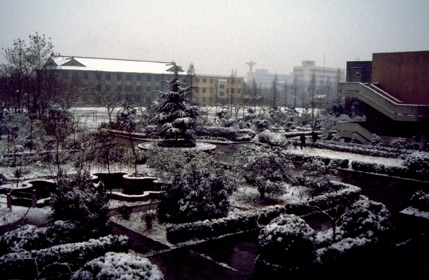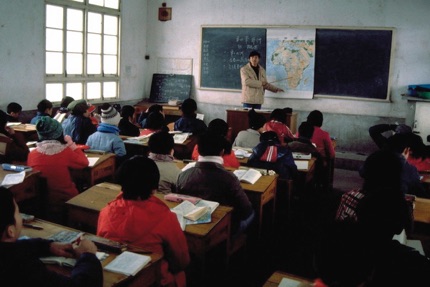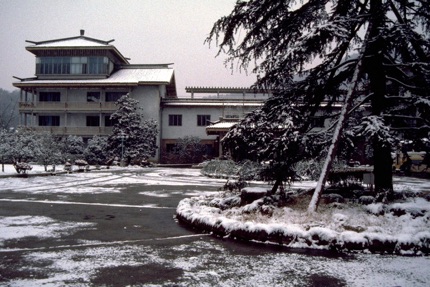China 1985

Kyrgyzstan and Tajikistan 2018

When we woke this morning, we saw that our surroundings were carpeted in a brilliant white layer of snow several inches thick. It had been snowing all night, and it continued snowing all that day. The whole city of Hangzhou looked like a Christmas card, especially in the gardens with their small upturned-roof pavilions. Unfortunately, the cold weather further affected my camera batteries, making photography a real exercise in frustration.
Because of the unexpectedly cold weather, our first stop that morning was to a local store to purchase thick, padded army coats with fur collars for the students. From there we proceeded to the Jun Xun (which means “Army Led”) Middle School where we were greeted by the Deputy Principal, Mr Liu. The school is not administered by the army, but is named after the street in which it is located.
During a briefing session in a reception room, the deputy told us about the school, its development, curriculum, co-curricular activities, policies, etc. We then visited three classrooms, seeing an English language class (calling out and answering questions by rote), a Geography class (doing climatic patterns of Africa) and a trigonometry class (doing I don't know what). While being shown around, one student found a watch which had been lost in the snow and handed it in to the deputy. Watches are a prized possession in China, and the deputy was most grateful, making a small speech on the theme that we could all learn from the public spirit and honesty of our student.
During recess, the boys talked with and exchanged snowballs with the students of the school. Then we visited the gym to watch some outstanding PE classes doing exercises, gymnastics and volleyball. The boys played a rope game with the local students and practised their volleyball. We learned that we were to return to the school the next day and that we had been challenged to a volleyball game. What the boys did not know yet was that they were to play a girls’ team, and it was a team from this school which had won the Hangzhou city championships, they had won the Zhejiang provincial championships, and they had came 8th in the national competition. Still, as the Chinese say, “Friendship first, Competition second”.
In the afternoon, we toured West Lake by boat. West Lake is regarded as Hangzhou’s principal scenic attraction, and as the guide said “It is a must to see”. The boat trip took a little over an hour, and I would sum it up by saying that it probably would have been better on a day when it was not snowing heavily and one could have seen the shores. Three of our students had a great time building a snowman on the bow of the boat. From West Lake, we walked through Huagang Park back to our bus. With its small pavilions and delicate landscaping, it looked most picturesque in the snow.
Our next visit was to the Liuhe (Six Harmonies) Pagoda, built about 1000 years ago and from which, on a fine day, one can see the Qiantangjiang Bridge and Hangzhou city. Octagonal in shape and 60 metres high, the wooden pagoda is 13 stories high on the outside, but only 7 on the inside, and it was apparently originally built to appease the river god and stop the tidal waves which periodically afflict the river. Like many other temples, it has been restored by the government following the destructive excesses of the Cultural Revolution.
Although the Liwhe Pagoda was only ten minutes drive from the Hua Jia Shan Guest House where we were staying, the return trip took almost two hours due to a monumental traffic jam. The cars approaching the Qiangtangjiang Bridge were skidding on the ice covering the roads and so were unable to make the ascent up the road. Queues of many kilometres had developed on all roads leading to the bridge, and the city seemed to seize. We had to feel sorry for the people squashed into the freezing local buses, standing for hours and yet showing no outward signs of impatience or distress. Because we did not have to cross the bridge, the police gave us special permission to drive on the wrong side of the road to by-pass part of the queue, but there were still long delays due to a narrow tunnel blocked by traffic. While we were waiting there, several local people with bicycles converted to carry goods were becoming stuck in the snow, so to their credit, several of our boys got out and helped push them clear (despite the embarrassment of our guide, l suspect). We learned from the waitresses next morning that many people eventually abandoned their vehicles (vehicles being trucks or buses) and walked home, while the local authorities “mobilised the masses” to clear the jam by the next morning.

Day 8
Hangzhou
Tuesday, 10 December 1985
